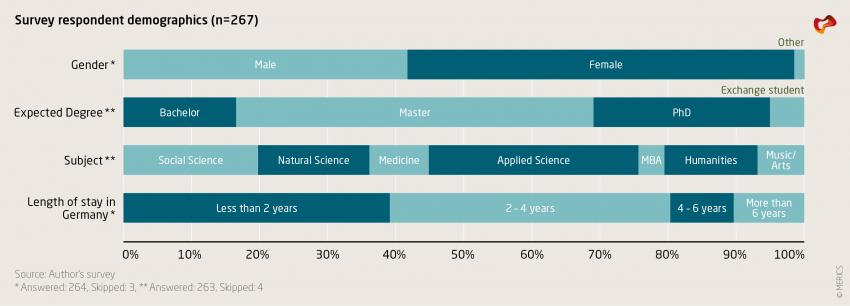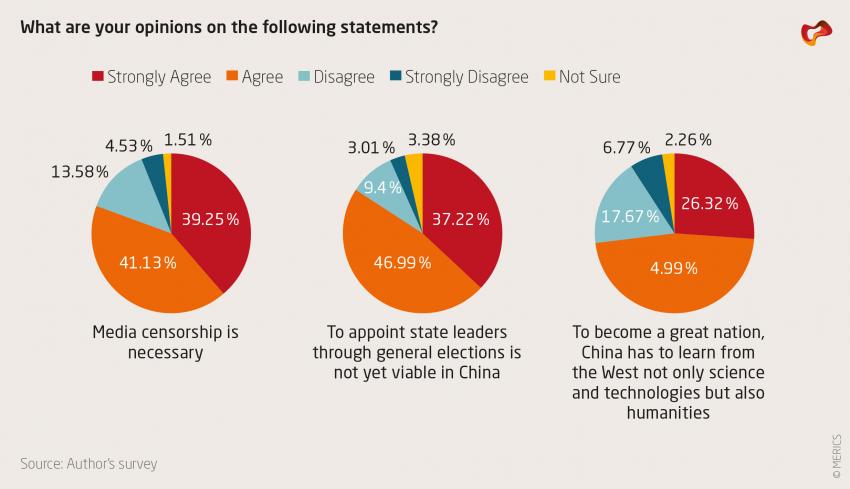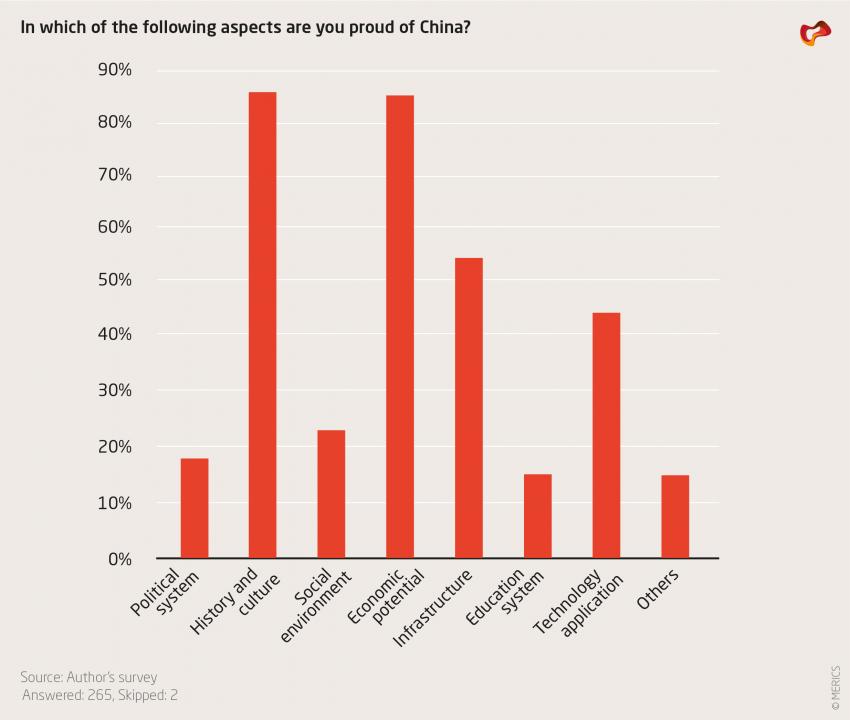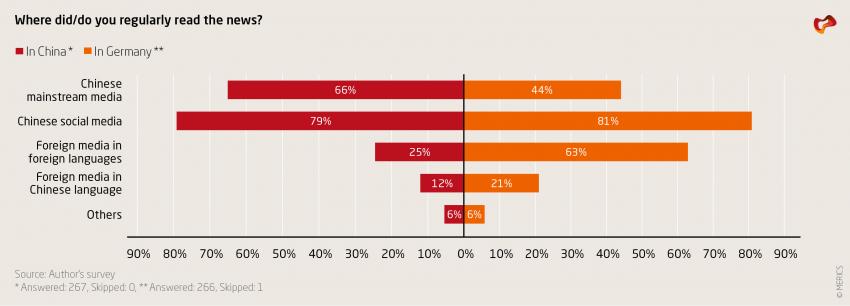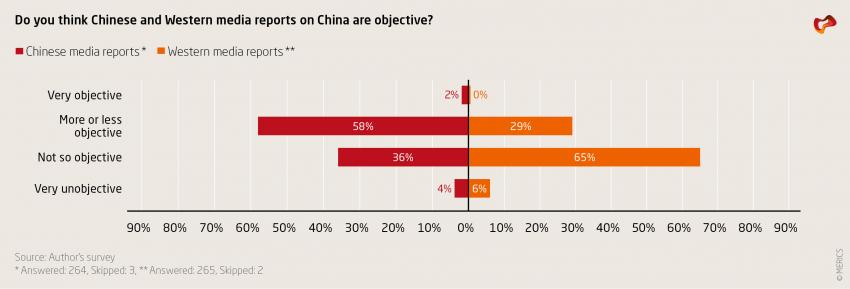
Conflicted hearts and minds
A survey of the political attitudes of Chinese students in Germany
Main findings and recommendations
- Chinese nationals make up a large proportion of international students. In 2018, 662,100 students left China to pursue higher education abroad. Although Anglophone countries are still their top destinations, an increasing number of Chinese students have been coming to Germany because of its strong programs in engineering and technology.
- Our survey of Chinese students in Germany has found conflicting attitudes about China’s authoritarian governance: although a majority approve of the political status quo and media censorship, only a small minority said they were proud of China’s political system as a whole.
- Many students explained their approval of the Chinese Communist Party (CCP)’s policies by citing official narratives, justifying authoritarian policies as means to uphold social stability. They demonstrated a lack of trust in their fellow citizens’ ability to make political decisions, but also unrealistic expectations of a liberal democratic system.
- After going abroad, Chinese students are not sufficiently integrated into the local society. Limitations in their language skills and the lack of an adequate orientation leads students to use social media from China as a main source of information. Moreover, a majority believed that Western media reporting about China is biased.
- Many interviewed students felt a strong sense of national identity and pride over China’s cultural and technological achievements. Since, for them, this is closely linked to their individual identity, they feel personally offended by Western criticism of China and react defensively.
- The attitudes of an overwhelming majority of interviewees towards China become more positive during their stay in Germany, while their views of the West become more diverse. They are critical of, i.e. challenges to liberal democracies such as the refugee crisis and Brexit, but on the other hand demonstrated strong interest to learn from the West in humanities and social sciences. They also appreciated the more liberal society, the social welfare system and the rule of law in Germany.
- Institutions in Germany should adopt communication strategies to better inform and integrate Chinese students and create environments in which students feel comfortable to debate even contentious issues.
- German education institutions should offer courses as part of the orientation to acquaint students from other value systems with rules of Western education institutions (i.e. academic freedom, diversity, democracy, open discussion/debate, etc.) as well as the roles of institutions (in particular the media) in Western systems.
1. Chinese overseas students are increasingly impacted by the systemic competition between China and the West
Chinese students make up a large proportion of international students in the world. Since the beginning of the reform and opening-up policies in 1978, more than 5.2 million Chinese have studied abroad. In 2018, more than 662,000 students left China to pursue higher education elsewhere.1 The majority of them headed for Anglophone countries, with the United States, the United Kingdom and Australia being the top choices.2 At American universities, Chinese students make up nearly one third of foreign students.3
Research has identified a variety of motivations behind Chinese students’ decisions to study abroad. Education in highly developed countries is generally considered as of better quality by Chinese students and parents.4 The fierce competition for top-notch universities in China pressures many to look for alternatives abroad. The desire to broaden the horizon, pursue personal development and gain a competitive edge on the Chinese job market also plays a role.5
European non-Anglophone countries are also becoming more popular among Chinese students: In 2018 there were almost 37,000 Chinese students enrolled in German universities, which makes them the largest group (13 percent) of international students.6
Germany has attracted Chinese students for its strength in technical and engineering fields.7 Many student returnees from Germany later became influential decision makers in their home country: for example, Lu Yongxiang, Vice-Chairman of China’s National People’s Congress and a member of the National manufacturing Strategy Advisory Committee, holds a PhD in Mechanical Engineering from RWTH Aachen University. Wan Gang, Vice Chairman of the Chinese People’s Political Consultative Conference and the former Minister of Science and Technology, obtained his PhD at Technical University Clausthal.
Chinese overseas students used to be wooed by host countries, partly because the tuition they paid contributed significant revenue to their educational institutions and their economies. In the US, they contributed an estimated USD 13 billion revenue to the economy in 2017-2018.8 In Germany tuition is not the main factor; some universities have been recruiting an increasing number of international (mostly Chinese) students as a response to declining enrollment rates caused by demographic change.9
Recently, however, Chinese students in a number of Western countries have found themselves in the center of conflicts. Outside China, they are increasingly under suspicion of being agents of CCP political influence or of gathering intelligence and engaging in intellectual property theft. From China, they face growing pressure to commit to patriotism and protect China’s interests abroad; otherwise they have to fear punishment back home. Last year, for instance, clashes between mainland Chinese students and supporters of the Hong Kong protest movement in Australia, New Zealand, Germany and the UK triggered international media coverage about their ideological standpoints.10
Several incidents in the past years have raised concerns that CCP influence could threaten academic freedom in Western liberal democracies. In 2017, Chinese students at Durham University in the UK complained to university’s officials about the invitation of Anastasia Lin, a former World Miss Canada and a human right advocate, to participate in an event hosted by the student debating society.11 Across the Atlantic at the University of California San Diego, Chinese students protested their university's invitation to the Dalai Lama as a keynote speaker.12 There were also cases of Chinese students challenging CCP-critical statements of professors or in textbooks on Taiwan’s status.13
Recently, Chinese overseas students in the United States have been particularly affected by distrust almost reminiscent of past campaigns against communism. Based on individual cases, the administration of US President Donald Trump deems US universities vulnerable targets for Chinese economic espionage and intellectual property theft.14 The FBI issued warnings calling Chinese students and scholars potential “nontraditional collectors of intelligence.”15 Since June 2018, the US has been restricting visa for Chinese citizens in fields such as robotics, aviation and high-tech manufacturing.16 However, these measures raised heated debates over undue “racial profiling” and an exclusion of talents who might potentially also contribute to scientific innovation in the US.17
Besides the suspicion encountered abroad, Chinese overseas students also risk being punished at home for activities deemed unpatriotic. For example, a student’s praise of US liberalism – and air quality – in her commencement speech at University of Maryland was sharply criticized by Chinese social and party-state media.18 In January 2020, a student at the University of Minnesota was sentenced to six months in prison after returning to China during a term break. He had published tweets critical of Chinese president Xi Jinping while in the United States.19
A number of scholars have investigated the existence and scope of the Chinese state’s political influencing of overseas students. A large-scale survey in American higher education institutions conducted by the Wilson Center in 2019 identified ways in which Chinese diplomats and students infringed on the academic freedom in the US. However, it also stressed that negative examples documented in the study merely represented “a tiny proportion” of the student body and warned that “any suggestion that all or most PRC students are CCP agents is appallingly broad and dangerously inaccurate.”20
A 2018 report by the Leiden Asia Center found no evidence of concerted political influencing activities by the Chinese government on Chinese overseas students and researchers in Europe but acknowledged signs that Chinese students abroad are subjected to increasing control from the political center.21 Implicitly targeting China, the Australian federal government has created a taskforce to investigate foreign interference in universities and released a guideline on how to build resilience in November 2019.22
This study was conducted to find out more about Chinese overseas students’ opinions about contentious issues involving China. With a survey and interviews conducted among students of PRC citizenship at institutions of higher education across Germany in 2018, the author of this MERICS China Monitor tries to present a more nuanced picture of the mindsets of this group and better understand their ideological stances.
2. Survey: Chinese students remain unconvinced by “Western” narratives
In order to gain a better understanding of Chinese students in Germany, the author of this MERICS China Monitor created an online questionnaire that included 16 close-ended questions with three general purposes:
- Measure their approval/disapproval toward some of the most contentious aspect of China’s governance model.
- Identify their media preference thus main sources of news when living in China and in Germany.
- Detect changes in their attitudes towards the West and China after they arrived in Germany.
Because the questionnaire gave respondents little space to elaborate upon their answers, ten semi-structured interviews with the intention to understand the reason behind their answers were conducted concurrently with random students who were willing to be interviewed during the survey distribution process. Both survey data and interviews were anonymized.
Diversified ways both online and offline were used by the researcher to ensure randomization of the sample. 267 respondents answered the questionnaire. According to the standard23 commonly used in social sciences for studying a population >10,000, this sample achieves a level of confidence 95 percent with a margin of error 6 and therefore their responses are largely representative of the whole population of Chinese students in Germany. Respondents were from 13 different federal states and therefore represented diverse backgrounds. The gender ratio of the sample size of this survey, however, is 7 percent over-represented by female students, when compared to the true gender ratio within the Chinese students’ group in Germany.24
Finding 1: Views of Chinese overseas students are strongly, but not exclusively shaped by CCP narratives
Survey results show that a majority of the students agree with key policies of authoritarian governance in China. For example, towards the statement “Appointing state leaders through general elections is not yet viable in China” 37.22 percent of the surveyed students chose “Strongly Agree,” 46.99 percent of them chose “Agree.” Towards the statement “Media censorship is necessary” 39.25 percent of the surveyed students chose “Strongly Agree,” 41.13 percent chose “Agree.”
In-depth interviews reveal that many students justify their answers by referring to CCP narratives, which argues that the paternalistic control is necessary due to fundamental cultural and developmental differences between China and the Western sphere. Concepts coined by the CCP such as “suzhi” (素 质) and “national conditions” (国情) were frequently cited by interviewed students. A considerable number of students supported their argument that Western democracy is not suitable for China by referring to China’s large population and their uneven level of education. As one interviewee stated, “I support the meritocracy used in China to select high level officials, because most people in China are gullible and have low “suzhi,” but I also support electoral democracy in Europe because most people here can think critically.”
(interview conducted April 2, 2018)
Many interviewed students also put in doubt their compatriots’ ability to recognize disinformation and they did not immediately associate censorship with a negative notion of control but more with the necessary protection of citizens provided by the CCP. More than half of them justified censorship as a tool to avoid damage caused by false information online.
“Suzhi” (素质)
“Suzhi” (素质) is a fairly unique Chinese concept that is used to describe the quality of people, taking into account aspects like physical and mental condition, morality, and educational background. In recent years, the Chinese government also promulgated the concept of “netizen suzhi” (网民素质),” defined as the ability of internet users to choose, understand, question, evaluate, create and produce, think about and respond to various media information online.”25
Guoqing (国情)
The CCP uses the term “national conditions” (国情) to circumscribe the particular challenges China is faced with, like a huge population, diverse ethnicities, thus justifying the necessity of special modes of governance, for example, one-child policy, hukou system and above all, socialism with “Chinese characteristics.” China’s unique “national conditions” were also emphasized in patriotic education campaigns to teach students that China’s realities are not compatible with Western values.26
With regard to China’s ban on foreign social media platforms such as Facebook, Twitter and Instagram, one respondent said that, “I can understand because many people in China are gullible. … China will turn into a mess if the West can spread provocative ideas to China through the internet.”
(interview conducted April 26, 2018)
Others, however, showed less willingness to justify the high level of censorship. Referring to a ban of memes comparing the cartoon character Winnie the Pooh with Chinese president Xi Jinping, one interviewee stated that, currently, “the government is a bit too insecure, more than necessary.”
(interview conducted April 20, 2018)
Interviewed students’ frequent reference to the term “national conditions” or narratives arguing that China’s political practices and values should be understood based on its own culture and history also shows a high-degree conformity of interviewed students to CCP ideology. For example, when asked whether liberal democratic values can be defined as universal, one student’s answer was particularly telling: “I don’t deny the existence of universal values, but I think the definition of it may not be what is narrated in the West… I think universalism can be a goal, but never an absolute standard. To define what universal values are one needs to also take historical and cultural context into consideration.”
(interview conducted April 15, 2018)
However, surveyed students’ answers towards other questions reveal that their views are not exclusively shaped by CCP narratives. For example, towards the statement “To become a great nation, China has to learn from the West not only in the fields of science and technology but also humanities.”
26.32% of the respondents chose "Strongly Agree." 46.99% of the respondents chose "Agree." Moreover, the approval of authoritarian policies such as media censorship among surveyed students contradicts their attitude towards China’s political system in general, as results from another question show: many of them do not see China’s political system as a main source of pride (Exihibit 3).
Finding 2: Chinese overseas students stick to homegrown social media and criticize Western media bias
China’s media censorship is notorious in the world of free speech and press. Therefore, it is plausible for many to assume that when Chinese citizens have the chance to leave China, they will embrace foreign media to obtain information which they could not access. However, the result of asking 267 Chinese students in Germany about their choices of media for news before and after leaving China
shows a different picture: regardless in China or Germany, the top choice for students to obtain news remained Chinese social media. What has changed is that when living in China, their second sources were Chines mainstream media and when living in Germany, their second sources become mainstream media in foreign languages.
Even for local news in Germany, many of the interviewed students revert to Chinese social media, where they can find grassroot outlets specifically targeting them.27 According to interviewees, professional news agencies’ channels on Chinese social media were also a popular local news source. One example is Daodejing (道德经), a WeChat public account managed by the European Times, a Europe-based Chinese language newspaper agency that publishes in nine European countries.28
Interviews revealed that Chinese social media remain popular among Chinese students in Germany for three reasons. First, they play an important role in keeping contacts back home and with fellows in Germany.29 Second, the language barrier still keeps Chinese students from consuming local, German media. Lastly, students apparently believe that Western media’s reporting on China is not objective. Many interviewees shared the opinion that Chinese media reports on China were more differentiated and that Western media lacked balance. As one student put it: “They always focus on the bad things.”
(interview conducted April 23, 2018)
Finding 3: Overseas students' attitudes towards China become more positive, views of the West are diverse
Survey results show that a majority of students had their attitudes towards China becoming more positive after moving to Germany. Interviews found several factors which contributed to this shift, among them are food, recent technological achievements like e-payment and more efficient infrastructure such as the public transport in China.
Surveyed students’ attitudes towards the West, however, are diverse. Some interviewees stated that they feel hurt when confronted with Western criticism of China and disapproved of being confronted with prejudice in their host country. “Usually the first thing people [in Germany] ask me is where I am from. They then go on to talk about the shady side of China, rarely mentioning the progress that China has made. If I disagree with them, I am immediately deemed as brainwashed by the Chinese government.”
(interview conducted April 15, 2018)
Challenges to liberal democracies such as the confrontational policies of US president Donald Trump, the refugee crisis in Europe and Brexit were also repeatedly mentioned in interviews as negatively influencing students’ attitudes towards Western democratic systems.
However, interviewees also expressed appreciation towards Western societies, their welfare system and rule of law: “People are encouraged to explore what constitutes a good life for themselves. There is less judgement in what people should choose to study, work, or their gender roles … In China we are all expected to live the same lifestyle to make money and buy cars and houses.” (interview conducted April 26, 2018). According to one interviewee, “I think Germany is a country very suitable for planning your whole life in. It is a safe country … there are not so many food safety incidents and unethical businessmen.” (interview conducted February 10, 2018). The academic environment in Germany was also rated positively.
3. Summary: Chinese students in Germany largely subscribe to CCP narratives and lack understanding of Western political systems and societies
Our survey among Chinese students in Germany reveals conflicted attitudes towards China’s governance system: although a majority showed approval towards authoritarian rule and media censorship, opinions of China’s political system as a whole were not necessarily positive.
However, the answers collected in this survey also hint to a lack of understanding of the German society as well as the rationale behind liberal democratic systems. This may be partly caused by Chinese students’ dependence on Chinese social media and therefore lack of integration into the local public sphere. Insufficient knowledge of how their host countries are governed also contributes to Chinese students’ distanced and critical views. For example, they are not aware of the special role media play in Western societies – to control those in power, reveal wrongdoings and push for readjustments, if necessary.
A lack of systematic training in critical thinking and argumentation can contribute to Chinese overseas students’ being incapable of dealing with criticism constructively. A recent study on Chinese student migration and integration in Finland and Germany found that the requirements of Western higher education based on Socratic/Aristotelian rhetoric are still unfamiliar to Chinese students, who are used to a traditional classroom teaching style.30
Our survey also revealed a strong interest in the fields of humanities and social sciences in the West and support for ideals of universal values, freedom and self-determination, despite official narratives being deeply engrained in students’ minds. Navigating between different cultures, political systems, social norms and academic environments, a significant number of students expressed more nuanced views than just simply adopting one type of ideology. This diversity should be taken into account by European actors when thinking about ways to better integrate Chinese overseas students.
4. Conclusion: Europe needs to better integrate Chinese students to avoid conflict and benefit from this talent pool
Contrary to the United States, the UK and Australia, there is so far no record of large-scale ideological clashes involving Chinese students in Germany. There are, however, indications of rising tensions: for example, when the General Student Committee of Technical University Berlin stated its solidarity with the students of Hong Kong Polytechnic University during the protests last year in a Facebook post, it received lots of criticism and even death threats from Chinese users. The Society of Chinese Academics at the university demanded an apology from the General Student Committee and a withdrawal of the statement.31
German education institutions and policymakers need to devise measures to prevent such ideologically motivated clashes that threaten the academic freedom and even students’ and faculties’ safety:
- offer courses as part of the orientation to acquaint students from other value systems with rules and liberal practices of Western education institutions (i.e. academic freedom, diversity, open discussion/debate, etc.) and the role of other institutions, in particular that of the media
- support Chinese students in integrating into the local public sphere
- create an environment that make students of different backgrounds feel comfortable to debate even contentious issues
Prior to 2008, over 50 percent of Chinese students chose to stay abroad after graduation. In recent years, Chinese governments of various levels have used monetary and social incentives to persuade overseas talents to move back to their home country.32 In 2018, over 80 percent of overseas students returned after graduation.33
Germany is a major target for China’s “Youth Thousand Talents Plan,” a strategy to lure highly skilled young scholars and researchers to return home. According to the Chinese embassy in Germany, among the talents selected 171 graduated in Germany, making the country the first biggest contributor in Europe and second globally after the US.34
Some recent returnees have become movers and shakers of China’s digital economy. Jiang Mingfeng, a graduate from Technical University of Berlin, established dxueshi.com, an online platform crowdsourcing expertise and technologies for China’s manufacturing sector.35 Xiao Yi, a graduate of Hamburg University of Applied Sciences, founded the startup Qiongyou, a digital platform for budget travelers, and raised EUR 60 million from investors.36
With a view to aging societies, it seems sensible to strengthen support for Chinese talents coming in. Germany in particular would be well-advised to convince at least some to stay to benefit more strongly from this workforce educated at its own schools: Contrary to the US, tuition fees in Germany are low, so it is the German state that invests in Chinese students but does not benefit from their skills if, once graduated, the overwhelming majority votes for building a career in their homeland.
Tapping into the talent pool of young Chinese more successfully will require educational institutions and European decision makers in this field to develop a more differentiated analysis of Chinese students’ attitudes and better understand their views and motivations. So far, the educational sector is failing to engage those parts of this group who are open to concepts of liberal democracy and would perhaps be ready to embrace the underlying values and principles – and pursue a career in their host countries.
- Endnotes
-
1 | Ministry of Education of the People’s Republic of China (2019). “2018年度我国出国留学人员情况统计 Statistics of Chinese students studying abroad in 2018). http://www.moe.gov.cn/jyb_xwfb/gzdt_gzdt/s5987/201903/t20190327_375704.html.
2 | The Economist (2018). “For China's elite, studying abroad is de rigueur.” https://www. economist.com/special-report/2018/05/17/for-chinas-elite-studying-abroad-is-de-rigueur. Accessed Jan. 27, 2020.
3 | BBC News (2019). “Trade war: How reliant are US colleges on Chinese students?” https://www.bbc.com/news/world-asia-48542913. Accessed Jan. 27, 2020.
4 | Bodycott, P. (2009). Choosing a higher education study abroad destination: What mainland Chinese parents and students rate as important. Journal of Research in International Education, 8(3), 349–373. https://doi.org/10.1177/1475240909345818. Accessed Jan. 27, 2020.
5 | 财看见Cai Kan Jian (2018). “48万留学生回国抢饭碗 三成月薪不到6000元(480,000 international students return home to find jobs, 30 percent monthly salary is less than 6,000 yuan).” Accessed Jan. 27, 2020. https://xw.qq.com/orignal/2018082103421/CRI2018082103421900. Accessed Jan. 27, 2020
6 | Deutsches Zentrum für Hochschul- und Wissenschaftsforschung, Deutscher Akademischer Austauschdienst (2019). Facts and Figures on the International Nature of Study and Research in Germany. http://www.wissenschaftweltoffen.de/kompakt/wwo2019_kompakt_en.pdf. Accessed Jan. 27, 2020.
7 | 无忧考网51 test (2019). 德国留学越来越受欢迎的原因. https://www.51test.net/ show/9257225.html. Accessed Jan. 27, 2020
8 | BBC News (2019). "Trade war: How reliant are US colleges on Chinese students?” https://www.bbc.com/news/world-asia-48542913. Accessed Jan. 27, 2020.
9 | The expert Council of German foundations on Integration and Migration Research Unit (2019). Countering Demographic Decline How Germany’s shrinking universities attract and retain international students. https://www.svr-migration.de/wp-content/uploads/2019/03/SVR-FB_Shrinking_Universities_EN.pdf. Accessed Jan. 27, 2020.
10 | The New York Times (2019). “What Chinese Students Abroad Really Think About Hong Kong's Protests.”www.nytimes.com/2019/09/15/world/australia/chinese-students-hongkong.html. Accessed Jan. 27, 2020; South China Morning Post (2019). “Hong Kong, Mainland Chinese Students in Conflict at New Zealand University.” https://www.scmp.com/news/asia/australasia/article/3020639/chinese-students-clash-new-zealand-university-over-hong-kong. Accessed Jan. 27, 2020; Tagesspiegel (2019). “Chinas patriotische Studierende in Deutschland.” https://www.tagesspiegel.de/wissen/von-annaeherung-keine-spur-chinas-patriotischestudierende-in-deutschland/24370522.html. Accessed Jan. 27, 2020; The Guardian (2019). “Hong Kong protesters in UK say they face pro-Beijing intimidation. https://www.theguardian.com/uk-news/2019/oct/18/hong-kong-protesters-uk-probeijing-intimidation. Accessed Jan. 27, 2020.
11 | The Times (2017). “Student debate will harm relations, insists China.” https://www.thetimes.co.uk/article/student-debate-will-harm-relations-insists-china-2vjjmfjtg. Accessed Jan. 27, 2020.
12 | Quartz (2017). “Chinese students in the US are using “inclusion” and “diversity” to oppose a Dalai Lama graduation speech.” https://qz.com/908922/chinese-students-at-ucsd-areevoking-diversity-to-justify-their-opposition-to-the-dalai-lamas-graduation-speech/.
Accessed Jan. 27, 2020.
13 | Quartz (2017). “Australian professors and universities are being shamed into apologizing for offending Chinese students.” https://qz.com/1064435/australian-professors-anduniversities-are-being-shamed-into-apologizing-for-offending-chinese-students/.
Accessed Jan. 27, 2020.
14 | South China Morning Post (2019). “US-China tech war shrouded by ‘new red scare’ as Donald Trump cracks down on IP theft.” https://www.scmp.com/economy/china-economy/article/3021024/new-red-scare-shrouds-us-china-tech-war-trump-cracks-down.
Accessed Jan. 27, 2020.
15 | Inside Higher Education (2018). “The Chinese Student Threat?.” https://www.insidehighered.com/news/2018/02/15/fbi-director-testifies-chinesestudents-and-intelligence-threats. Accessed Jan. 27, 2020.
16 | The New York Times (2018). “Visa Restrictions for Chinese Students Alarm Academia.” https://www.nytimes.com/2018/07/25/us/politics/visa-restrictions-chinese-students.html.
Accessed Jan. 27, 2020.
17 | SCMP (2019). “Why Trump’s clampdown on academia is forcing many Chinese researchers into a difficult corner.” https://www.scmp.com/tech/policy/article/3014185/why-trumpsclampdown-academia-forcing-many-chinese-researchers. Accessed Jan. 27, 2020.
18 | The Guardian (2017), “Chinese student abused for praising 'fresh air of free speech' in US.” https://www.theguardian.com/world/2017/may/23/china-yang-shuping-free-speechuniversity-of-maryland-us-student. Accessed Jan.28, 2020.
19 | Axios (2020). “University of Minnesota student jailed in China over tweets.” https://www.axios.com/china-arrests-university-minnesota-twitter-e495cf47-d895-4014-9ac8-8dc76aa6004d.html. Accessed Jan.28, 2020.
20 | Anastasya Lloyd-Damnjanovic (2018). “A Preliminary Study of PRC Political Influence and Interference Activities in American Higher Education.” https://www.wilsoncenter.org/publication/preliminary-study-prc-political-influence-and-interference-activitiesamerican-higher. Accessed Jan. 27, 2020.
21 | Ingrid d’Hooghe, Annemarie Montulet, Marijn de Wolff and Frank N. Pieke (2018). https://leidenasiacentre.nl/wp-content/uploads/2018/11/LeidenAsiaCentre-Report-Assessing-Europe-China-Collaboration-in-Higher-Education-and-Research.pdf. Accessed Jan. 27, 2020.
22 | https://thepienews.com/news/foreign-interference-guidelines-welcomed-australian-unis/. Accessed March 17, 2020.
23 | Necessary Sample Size = (Z-score)² * StdDev*(1-StdDev) / (margin of error)
24 | DZHW & DAAD (2020). Wissenschaft weltoffen 2019.
25 | 新浪科技Sina Tech (2015). 网民"素质"调查报告:看看你合格吗Netizen "Quality" Survey Report: See if You Are Qualified.
26 | Suisheng Zhao (1998), Communist and Post-Communist Studies Volume 31, Issue 3, “A state-led nationalism: The patriotic education campaign in post-Tiananmen China.” https://doi.org/10.1016/S0967-067X(98)00009-9. Accessed January 27, 2020.
27 | WeChat users can set up public accounts to gather followers, send them content and service notifications, or redirect them to a website. One example of grassroot WeChat account targeting overseas students in Germany is the public account of WEGZUDE (留
德圈. Originally founded by two students, it is now managed by over 30 students from different universities across Germany, with over 100,000 subscribers. The account provides practical information like job ads and advice on flat search and news related to China and
Europe.
28 | 欧洲时报 (The European Times). http://www.oushi.de/cn/info
29 | More detailed research on this topic can be find in Hua Pang, (2018) "Understanding the effects of WeChat on perceived social capital and psychological well-being among Chinese international college students in Germany," Aslib Journal of Information Management, https://doi.org/10.1108/AJIM-01-2018-0003
30 | Hanwei Li (2019), “The Journey of a Thousand Miles Chinese Student Migration and Integration in Finland and Germany.” https://trepo.tuni.fi/bitstream/handle/10024/105073/978-952-03-0957-2.pdf?sequence=1&isAllowed=y. Accessed January 27, 2020.
31 | Tagesspiegel (2020). “Asta der TU Berlin erhält Morddrohungen” (Asta from the TU Berlin receives death threats). https://www.tagesspiegel.de/wissen/nach-solidaritaetserklaerung-mit-hongkong-asta-der-tuberlin-erhaelt-morddrohungen/25280270.html. Accessed February 17, 2020.
32 | Financial Times (2018). China in push to lure overseas tech talent back home. https://www.ft.com/content/84d27f6a04bc-11e8-9650-9c0ad2d7c5b5. Accessed January 27, 2020.
33 | Ministry of Education of the People’s Republic of China (2019). “2018年度我国出国留学人员情况统计 Statistics of Chinese students studying abroad in 2018). http://www.moe.gov.cn/jyb_xwfb/gzdt_gzdt/s5987/201903/t20190327_375704.html. Accessed March 17, 2020.
34 | The European Times (2017). 中国迎来最大海归潮:政策很有吸引力 学子归国热情高 (China welcomes the largest wave of returnees: policies are attractive, students return home with high enthusiasm). http://www.oushinet.com/wap/qj/qjnews/20170911/272059.html. Accessed January 27, 2020.
35 | Chine.com (2016). 政协领导鼓励大学仕产学对接,助力常州智造(Leaders of the CPPCC encourage university-industry connections to help Changzhou's intelligent production). http://science.china.com.cn/2016-08/25/content_8989966.htm. Accessed March 17th.2020.
36 | The Paper (2017). 访谈|你怎么定义失败?穷游网创始人肖异的回答亮了 ( Interview|How do you define failure? The answer from Xiao Yi, founder Qyer.com, is bright ). https://www.thepaper.cn/newsDetail_forward_1864687. Accessed March 17, 2020.
Download the Questionnaire here:
